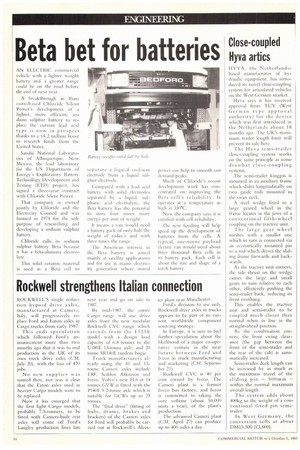Beta bet for batteries Hyva
Page 16

If you've noticed an error in this article please click here to report it so we can fix it.
AN ELECTRIC commercial vehicle with a lighter weight battery and a greater range could be on the road before the end of next year.
A breakthrough in Runcorn-based Chloride Silent Power's development of a lighter, more efficient, sodium sulphur battery to replace the current [cad acid type is now in prospect thanks to a £4.2 million boost to research funds from the United States.
Sandia National Laboratories of Albuquerque, New Mexico, the lead laboratory Mr the US Department of Energy's Exploratory Battery Technology Development and Testing (ETD) project, has signed a three-year contract with Chloride Silent Power.
That company is owned jointly by Chloride and the Electricity Council and was formed in 1974 for the sole purpose of researching and developing a sodium sulphur battery.
Chloride calls its sodium sulphur battery Beta because it has a beta-alumina electrolyte.
This solid ceramic material is used in a Beta Cell to separate a liquid sodium electrode from a liquid sulphur electrode.
Compared with a lead acid battery with solid electrodes separated by a liquid, sulphuric acid electrolyte, the Beta battery has the potential to store lour fillies more energy per unit of weight.
It means a van would need a battery pack of only half the weight of today's and with three times the range.
The American interest in the Beta battery is aimed mainly at satellite applications and for use in mains electricity generation where ,aored
power can help to smooth out demand peaks.
Much of Chloride's recent development work has concentrated on improving the Beta cell's reliability. It operates at a temperature as high as 350°C.
Now the company says it is satisfied with cell reliability.
The new funding will help speed up the development of batteries from the cells. A typical, one-tonne payload electric van would need about three thousand Beta cells in its battery pack. Each cell is about the size and shape of a torch battery.












































































































